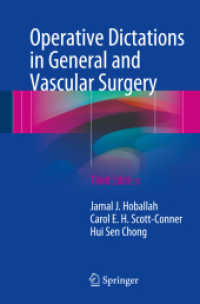- ホーム
- > 洋書
- > 英文書
- > Politics / International Relations
Full Description
Since the beginning of US President Donald Trump's second term, the already volatile international order has faced increasingly disruptive developments and fundamental challenges. This volume outlines and analyses the role of Latin America as a whole, and of individual countries including Argentina, Brazil, Chile, Colombia and Mexico, in the new global (dis)order.
The book is divided into three parts. The first contains contributions on regional dynamics in Latin America: What do global developments mean for Latin America's development options? What are the consequences for Latin American regionalism? Why have regional democracy clauses repeatedly proved ineffective? The second part examines the role of external actors in Latin America: the USA, China, the European Union and Russia. The third section analyses the foreign policies of single states and asks what role concepts such as 'active non-alliance' and 'feminist foreign policy' play for Latin America. In their concluding remarks, the editors analyse the potential consequences of Trump's policies for the topics covered in the volume after the first 100 days of his Administration.
The volume provides an up-to-date, theory-based examination of key issues in Latin American international relations and is essential reading for scholars, students, policymakers and others interested in Latin American international relations.
Introduction, chapter 11 and Conclusion of this book is freely available as a downloadable Open Access PDF at http://www.taylorfrancis.com under a Creative Commons [Attribution-Non Commercial-No Derivatives (CC BY-NC-ND)] 4.0 license.
Contents
The Editors and Contributors
Introduction
Peter Birle and Claudia Zilla
PART I: Regional and International Dynamics
1 Changes in the Global Economy and New Challenges for Development Policy in Latin America
Andrés Musacchio
2 New Regional Dynamics in Latin America or Old Wine in New Bottles?
Detlef Nolte
3 Electoral Cycles and Presidentialism. Advantages or Disadvantages for Latin American Regionalism?
Susanne Gratius
4 Why Latin American Regional Democracy Clauses Have Fallen Short of Expectations
Brigitte Weiffen
5 Latin American Regionalism: From Contestation to Depoliticisation
José Antonio Sanahuja
PART II: The Role of External Actors
6 Latin America and the United States in the New World Disorder: Hierarchy, Heterarchy and Multiplicity
Jochen Kleinschmidt
7 China in Latin America - Strategic Engagement and Patient Diplomacy
Benjamin Creutzfeldt
8 Latin America-Russia Relations: The War in Ukraine as a Turning Point?
Alexandra Sitenko
9 The European Union and Latin America. Towards a Renewal of the Bi-regional Partnership?
Peter Birle
PART III: The Foreign Policies of Latin American Governments
10 Reshaping Priorities: Latin American Foreign Policies in a Shifting Global Order
Federico Merke
11 Feminist Foreign Policy in Latin America: The approaches of Mexico, Chile and Colombia
Claudia Zilla
12 The International Insertion Strategies of Latin America between Autonomy and Structural Constraints
Gian Luca Gardini
13 Argentina's Foreign Policy under President Alberto Fernández (2019-23): Legitimacy, Internal Differences and Foreign Debt
María Cecilia Míguez
14 Brazilian Foreign Policy beyond Itamaraty's Insulation and Presidential Diplomacy: Intermestic Processes under the Bolsonaro and the Third Lula Administrations
Andrea Ribeiro Hoffmann
15 Chile One Year into the Government of Gabriel Boric: Foreign Policy and International Relations in a New Political Period
Raúl Bernal-Meza and Sergio González Pizarro
16 Colombia's Foreign Policy Discourses under Gustavo Petro: The Formulation of a New National Role with a Progressive Populist Approach
Eduardo Pastrana Buelvas and Diego Vera
17 The Perils of Multiple Foreign Policies - Mexico's Diminishing Presence in World Politics
Günther Maihold
PART IV: Conclusions
Concluding Remarks: Latin America's International Options in the Age of Trump 2.0
Peter Birle and Claudia Zilla







